Good nightpublished at 21:21 GMT 8 March 2017
Thanks for tuning in. Business Live will be back tomorrow from 6am.
Chancellor Philip Hammond has presented the 2017 Spring Budget
Budget provides "strong, stable platform for Brexit" Chancellor says
National insurance contributions will rise for the self-employed
£2bn extra for adult social care
Economic growth forecast raised for 2017 to 2%
Borrowing forecast cut to £51.7bn in 2016
Labour: Budget of 'utter complacency'
Get in touch: bizlivepage@bbc.co.uk
Dan Macadam and Karen Hoggan
Thanks for tuning in. Business Live will be back tomorrow from 6am.
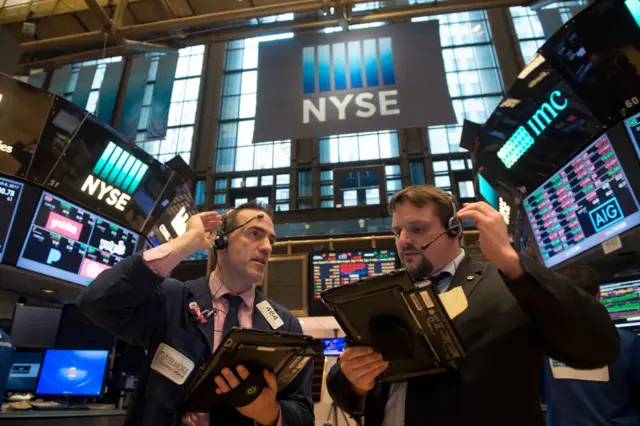 Image source, Getty Images
Image source, Getty ImagesWall Street markets closed broadly lower after a sharp fall in the price of oil hit energy stocks.
The Dow Jones lost 0.33% to 20,855.73 while the S&P 500 shed 0.23% to 2,362.98. The tech-heavy Nasdaq climbed 0.06%, however, to 5,837.55.
The price of Brent Crude oil slipped 5% to $53.13 on fears that rising US production would offset Opec efforts to curb supply, thereby suppressing prices.
Newsnight's policy editor tweets...
Allow X content?
This article contains content provided by X. We ask for your permission before anything is loaded, as they may be using cookies and other technologies. You may want to read X’s cookie policy, external and privacy policy, external before accepting. To view this content choose ‘accept and continue’.
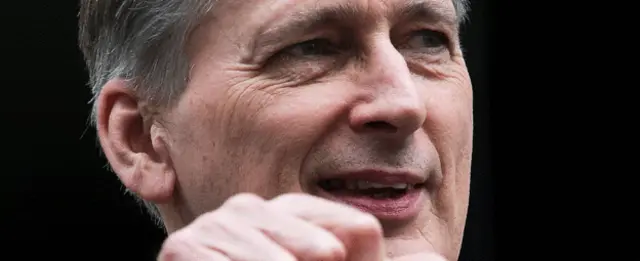 Image source, Getty Images
Image source, Getty ImagesThe Scottish government will receive a £350m funding boost as a result of measures announced in his budget , the chancellor has said.
The additional Barnett formula money will come from increased UK government spending on areas such as education.
Mr Hammond told the House of Commons that the additional funding demonstrated that "we are stronger together in this great United Kingdom".
He also confirmed additional help for the North Sea oil and gas industry .
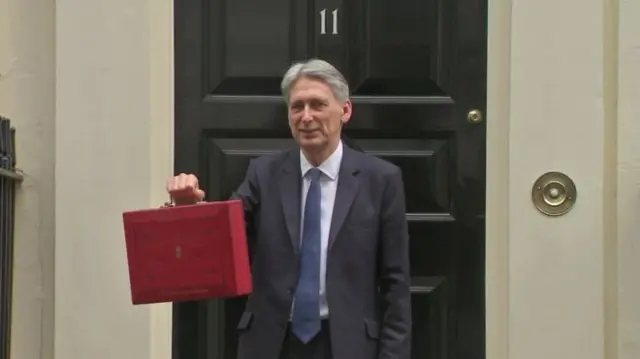
The chancellor's Budget gave no clarity on the future of Welsh Government finances, a senior minister has said.
Philip Hammond announced an extra £200m for Wales over four years.
However, Welsh Finance Secretary Mark Drakeford said it was still not clear how future UK spending cuts of £3.5bn would affect Welsh public services.
Welsh Secretary Alun Cairns said the Welsh Government had the "freedom to invest" extra cash in their priorities. Read more here
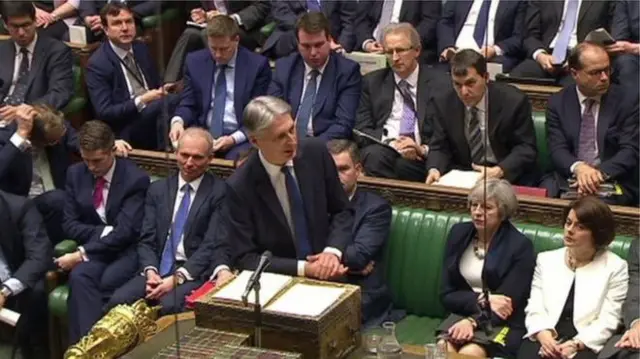 Image source, House of Commons
Image source, House of CommonsThe Northern Ireland Executive will receive a small amount of additional funding as a result of the budget.
There will be an extra £90m for day-to-day spending through to 2019-20 while the capital budget will get an extra £30m through to 2020/21.
Stormont's annual budget for day-to-day spending is around £10bn, while the capital budget is around £1bn.
The amount Stormont will have for day-to-day spending is still expected to fall in 2015-2020. Read more here
 BBC News Channel
BBC News Channel
The chancellor kicked off the Budget by laying out his economic forecasts, but Carl Emmerson, deputy director of the Institute for Fiscal Studies, told the BBC Mr Hammond has to bear in mind the uncertainties of triggering Article 50.
Quote MessageForecasts are always going to turn out to be incorrect but I think it's certainly the case at the moment there's more uncertainty, more risk than what we normally have so we shouldn't be surprised if things turn out very, very different to what anyone thinks is going to happen. Let's hope that's because things turn out a lot better but of course it could be that things turn out worse, which gives the Chancellor some reasons for wanting to not spend some of the extra money that's he's managing to bank this year.
Carl Emmerson , Deputy director, Institute for Fiscal Studies
 Kamal Ahmed
Kamal Ahmed
Economics editor
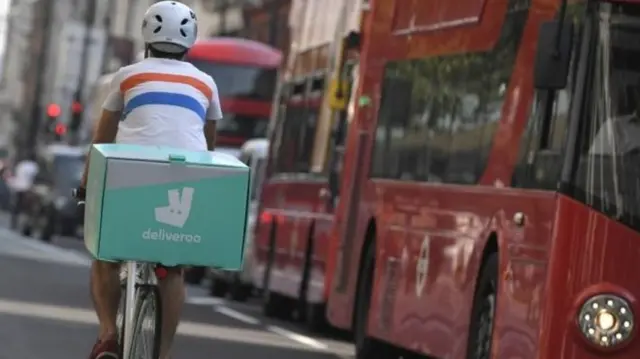 Image source, Reuters
Image source, ReutersThe growth of the gig economy, self-employment and hyper-flexible working - big issues that the chancellor wants to tackle.
Although the Chief Secretary to the Treasury, David Gauke, suggested to the BBC that the government had gone far enough on raising taxes on the self-employed, any companies that use self-employed workers should start looking down the back of the sofa for some money.
Uber and Deliveroo - the Treasury is on your case.
Philip Hammond regularly cites evidence that the growth of self-employment is undermining the tax base - by between £3.5bn and £5bn a year by 2020 potentially. Read more from Kamal here
Budget: How funny is the Chancellor?
Philip Hammond gave it his all.
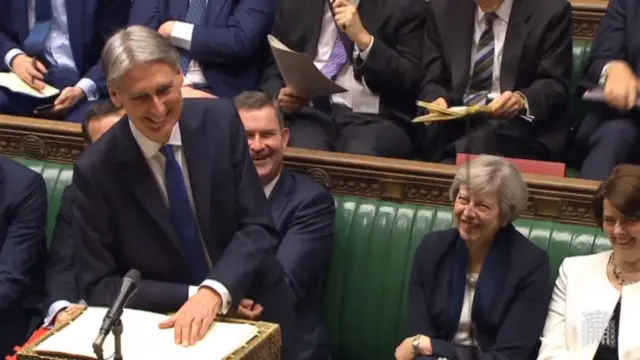 Image source, PA
Image source, PAThe Budget may not have been a laugh a minute, but there were a few lighter moments.
Not surprisingly, perhaps, one of the chancellor's gags involved the UK's relationship with the EU.
"Overall, public sector net borrowing as a percentage of GDP is predicted to fall from 3.8% last year to 2.6% this year," said Mr Hammond.
"And for those who care about such things, it means we are forecast to meet our 3% EU Stability and Growth pact target this year for the first time in more than a decade.
"But I won't hold my breath, Mr Deputy Speaker, for my congratulatory letter from Jean-Claude Juncker," he quipped.
 Image source, Getty Images
Image source, Getty ImagesThe £300m relief fund for firms hit by rising business rates will help councils identify those that need it the most, according to the Local Government Association.
One of the biggest collectors of business rates, Westminster Council, also welcomed the measure.
“Westminster collects over 8% of national business rates, so we hope that we will be able to use some of this additional local authority funding to reduce the burden on our businesses and encourage growth," said Westminster City Council deputy leader, Robert Davis.
 BBC Radio 5 live
BBC Radio 5 live
Money saving expert Martin Lewis examines the government's final spring budget.
What does the Budget mean for savers and investors?
Martin Lewis chatted it through with 5 Live's Anna Foster and tells her that the Budget was not the "great saviour that savers had hoped for".
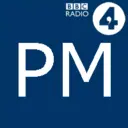 Radio 4 PM
Radio 4 PM
The Conservative MP, Jacob Rees-Mogg, said he's concerned that the National Insurance rise for the self-employed could "reduce the flexibility" that was so beneficial to the UK economy.
Mr Rees-Mogg also said it was "very hard to see" how the policy squared with the precise wording of the Conservative 2015 manifesto, which was "absolutely clear" on not increasing National Insurance.
Allow X content?
This article contains content provided by X. We ask for your permission before anything is loaded, as they may be using cookies and other technologies. You may want to read X’s cookie policy, external and privacy policy, external before accepting. To view this content choose ‘accept and continue’.
 Image source, Getty Images
Image source, Getty ImagesThe most significant part of today’s budget announcement were the economic growth upgrades for this year, according to the pro-Brexit group, Economists for Free Trade.
The OBR is now forecasting the UK economy will grow by 2% in 2017, which is closer to the economists' own forecast of 2.3%.
However, the economists say it's "alarming" that despite a "clear direction" on Brexit, the OBR assumes that the pace of import and export growth will slow down for the next 10 years.
Quote MessageThere is simply no basis for such a broad assumption, unless one were to believe that the government will pursue economically self-harming policies. Our research has shown, if we follow the right policies to tariff-free trade, all of which is in our own control, the economy will be supported by an additional 4% growth to GDP."
Torsten Bell, head of the Resolution Foundation, external , says this decade is on course to be the worst for pay growth in over two centuries.
Allow X content?
This article contains content provided by X. We ask for your permission before anything is loaded, as they may be using cookies and other technologies. You may want to read X’s cookie policy, external and privacy policy, external before accepting. To view this content choose ‘accept and continue’.
Do tax changes in the Budget leave you better or worse off?
Use our Budget calculator, developed by Deloitte, to find out how the tax measures may affect you in the coming year.
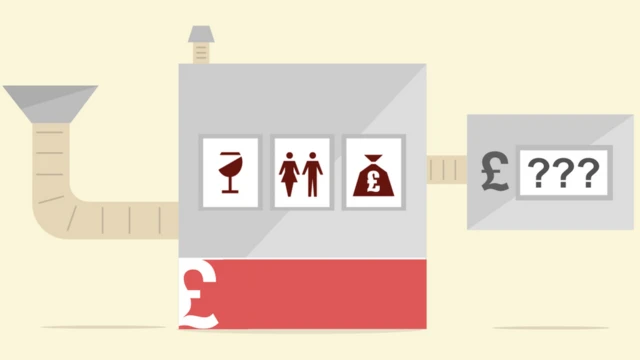
Use our Budget calculator to find out how your pocket may be affected by the latest tax measures.
Read More BBC News UK
BBC News UK
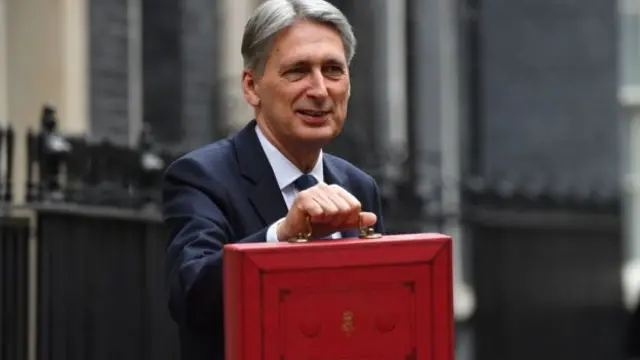 Image source, AFP/Getty Images
Image source, AFP/Getty ImagesBBC economics editor Kamal Ahmed says that although it was a relatively small Budget, it contained two big reviews.
The first was on the taxing of work. This will be a huge debating point over the next few years of this government, he says.
The other was on social care, which will enable a major debate about "how we pay for an ageing population".
The Social Market Foundation has produced a timely report, external examining what occupations have the highest levels of self-employment.
It found that over half are in highly-skilled jobs - including managers, professionals and skilled trades.
Allow X content?
This article contains content provided by X. We ask for your permission before anything is loaded, as they may be using cookies and other technologies. You may want to read X’s cookie policy, external and privacy policy, external before accepting. To view this content choose ‘accept and continue’.
 Image source, Getty Images
Image source, Getty ImagesThe boss of tech company UKFast, Lawrence Jones, has reacted strongly to the changes to National Insurance contributions for the self-employed.
He says it's "unquestionably a disincentive for risk takers".
"It’s grossly unfair to claim they’re levelling out the tax to balance with employees when employees get so many extra rights like sick pay, holiday, pensions and maternity pay. How much is that worth? I’d be thinking 'why take the risk?'"